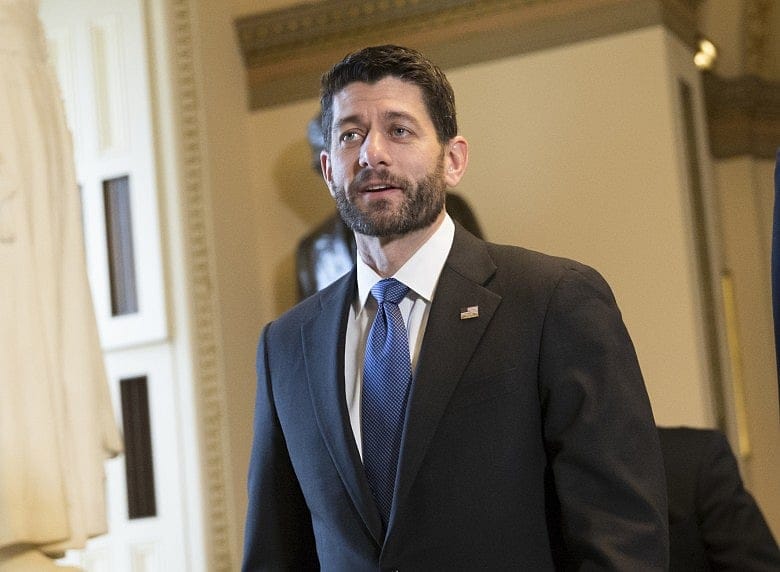Congress sends year-end spending measure to Obama

WASHINGTON (AP) — Congress on Friday sent President Barack Obama a bipartisan but deficit-boosting year-end spending package that raises federal agency budgets and awards tax cuts to both families and a sweeping array of business interests.
A 65-33 Senate vote on the $1.8 trillion measure shipped it to the White House. The bill combines $1.14 trillion in new spending in 2016 and $680 billion in tax cuts over the coming decade. It had earlier swept through the House of Representatives on a pair of decisive votes on Thursday and Friday, marking a peaceful end to a yearlong struggle over the budget, taxes, and Republican efforts to derail his regulatory agenda.
Obama will sign the measure, which includes many of the spending increases he fought for all year and is largely cleansed of GOP attempts to block his moves on the environment, financial regulation, and consumer protection. Republicans won increases for the military and an end to a ban on exporting U.S. oil, as well as permanent tax cuts for business investment. The measures increase spending by an average 6 percent above tight caps on departments across the government.
The congressional Joint Committee on Taxation estimates the legislation will increase the fiscal 2016 budget deficit by $157 billion and by $95 billion in 2017, Reuters reported.
Republicans were evenly split with 27 of them voting in favor and 26 against the bill. Presidential contender Marco Rubio, a Florida senator, was absent. Only six Democrats and Vermont Independent Bernie Sanders, another presidential hopeful, voted against the measure.
"Washington's leadership has created another massive spending bill in secret and rammed it through Congress, hoping that the American people don't notice or have become numb to this kind of business as usual," Rubio said in a statement, saying it demonstrates that Congress needs "conservative presidential leadership." GOP presidential aspirants Senators Ted Cruz of Texas and Rand Paul of Kentucky voted against the bill, while longshot Lindsey Graham of South Carolina supported it.
With the votes, lawmakers wrapped up a surprisingly productive, bipartisan burst of late-session legislation in a divided Congress.
The measure received big bipartisan majorities in both House and Senate. It capped an impressive first few weeks for new Speaker Paul Ryan, R-Wis., who got the benefit of the doubt from most Republicans, who by a wide margin opposed earlier legislation that established the framework for the budget package.
Ryan took a call from Obama after the vote and told reporters that the president thanked him for helping make government work.
House Democratic leader Nancy Pelosi of California, a key negotiator, swung forcefully behind the measure after showing initial frustration over its lifting of an oil export ban and lack of action on helping Puerto Rico address its fiscal woes.
"They wanted big oil so much that they gave away the store," Pelosi said. But she cited successes in driving away most GOP policy proposals from the measure. Democratic also pushed through higher domestic budgets and tax breaks for working families and renewable energy.
Ryan cited the lifting of the oil export ban, a large increase for the Pentagon, and curbs on the activities of the Environmental Protection Agency and the IRS as wins for Republicans.
But tea party lawmakers were dismayed by the burst of spending and a lack of wins for conservatives.
"There are so many things in this bill that will be surprising and shocking to the American people," said Rep. Walter Jones, R-N.C.
The House voted 316-113 to pass the spending portion of the package on Friday, when it won support from Republicans by a 150-95 margin. Democrats followed Pelosi's lead and backed the bill by a 166-18 margin. In a procedural quirk, the House passed most of the tax cuts — virtually all of them financed with deficit dollars — on Thursday.
The bill extends more than 50 expiring tax cuts, with more than 20 becoming permanent, including credits for companies' expenditures for research and equipment purchases and reductions for lower-earning families and households with children and college students.
The spending measure would fund the operations of every Cabinet agency. It awards increases of about 6 percent, on average, above tight spending caps that were a relic of a 2011 budget and debt deal — and were opposed by both GOP defense hawks and Democrats seeking boosts in domestic spending.
The budget pact was the last major item in a late-session flurry of bipartisanship in Washington, including easy passage of long-stalled legislation funding highway programs and a rewrite of education programs.
Many on each side saw the budget deal as the best they could get under divided government. The need to win Obama's signature helped rid the measure of most of the controversial GOP provisions: killing federal money for Planned Parenthood, limiting the flow of Syrian refugees and undoing dozens of Obama actions on the environment, labor, financial regulation and relations with Cuba.
The measure contains large spending boosts for veterans and medical research, and funds a familiar roster of grants for transportation projects, first responders and community development.
Also crammed into the two bills are provisions trimming some of the levies that help finance Obama's prized 2010 health care overhaul, including two-year suspension of a tax on medical devices and, in a victory for unions, a two-year postponement of a "Cadillac tax" on higher-cost insurance policies.
Written by Andrew Taylor

